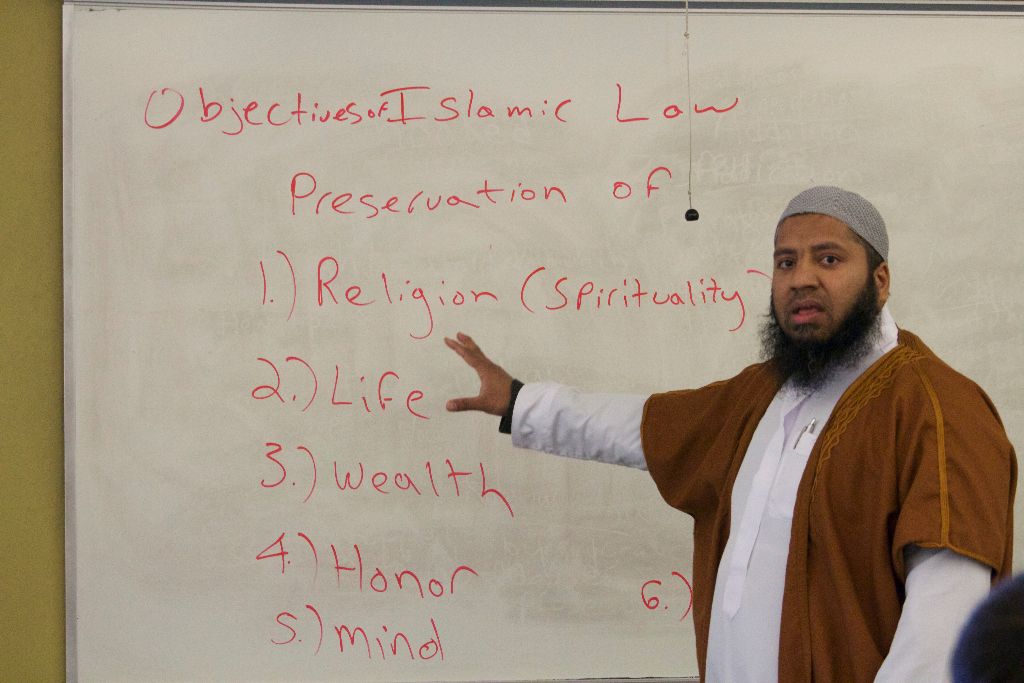Separate spheres: local Imam discusses gender relations in Islam

Andrea Currie
News Editor
“The woman doesn’t have to work at all. She’s like a queen in Islam,” said Imam Faisal Ahmad, discussing Islam’s teachings on the responsibilities of men and women in marriage. Ahmad was speaking to the ten students who attended the Muslim Student Association’s (MSA) Mar. 2 discussion, “Gender Relations in Islam.”
Ahmad, a scholar of Islamic law who grew up in Albany, graduated from RPI, and now runs the Albany-based Fiqh Institute, began his talk with a short prayer and a greeting to the audience. “I have a degree in sharia [Islamic law], and this is one of the hot topics,” he said. “Definitely, it’s a topic that I think is greatly misunderstood, in the West especially.”
Ahmad first discussed Islam’s teachings on men and women’s status. “Men and women in Islam are considered equal in terms of their spiritual origins,” said Ahmad. He quoted passages from the Quran stating that men and women were created from a single soul.
He said that in Islam, men and women have differing rights and responsibilities. “Now somebody might ask you—and this is probably what we hear a lot in feminist circles—that in order for a woman to be treated equally as a man, she has to have the same rights and responsibilities,” said Ahmad.
He continued, “What Islam says is that a woman does not have to become a man to be treated equally.” Rather, said Ahmad, both women and men have strengths and weaknesses.
The prophet Muhammad turned to his wife Khadija for support when the people rejected him, Ahmad said. Conversely, he added, a man must provide and care for his wife and children.
Ahmad then asked the audience, which was mostly Muslim, for examples of behavior prohibited by Islam.
“Sexual relations,” someone offered.
“Sexual relations outside of the marriage bond is not allowed. This is clearly prohibited. Right,” said Ahmad.
“Dating,” said a male student.
“Casual friendships, and getting [dinner], that could lead to the sexual relationship before marriage. Okay, good,” said Ahmad.
He continued, “Even if we go out of sexual relations, should a man and a woman kiss, hug, touch each other? … Just a man and a woman, if they’re by themselves in a room, who’s the third?”
“The devil,” said several students in unison.
“The devil, right,” said Ahmad, saying that this was one of the hadiths, teachings of Muhammad.
“What is allowed in Islamic law between genders? What is definitely permissible?” asked Ahmad.
“Marriage,” said one audience member, eliciting laughs from the group and a confirmation from Ahmad, who quoted the prophet Muhammad: “O young men and women, whoever has the ability to get married, then do so, because it will help you to maintain chastity, and it is easier to control the desires and the gaze.”
Ahmad said that depending on the circumstances, marriage could be legally obligatory, encouraged, neutral, disliked, or prohibited: for example, if a man could not afford to pay his wife’s expenses, he would not be encouraged to marry, since he could not fulfill his rights according to Islam.
“What happens if he’s afraid he’s going to fall into sin?” asked Saad Tai, president of the MSA. Ahmad quoted another hadith, which says that those who cannot afford to marry but fear having sexual relations must fast, because fasting weakens the body and its desires.
Ahmad said that Islam restricts interactions between men and women for good reasons.
“Islam wants to protect the family. Islam wants to protect our spirituality,” he said. “For a man, for example, if there’s no regulation of how the opposite gender should dress in society, if a man lives in a society like that, where women do not dress at all, is he going to be a very spiritual person? I don’t know. I mean, I think if you think about it rationally, Islam is very practical.”
Marriage can be an act of worship, said Ahmad, if sanctioned by God. “Love is a natural desire,” said Ahmad, adding that the greatest possible love was loving God. “Without that relationship with God, any other love is meaningless. It’s just physical, and it will disappear.”
Ahmad said that Islam permits divorce, but only as a last resort. “Islam wants to have a family unit where the child knows who his father is, and the father is responsible,” said Ahmad. He said that the Islamic law objective of preserving lineage was a major reason for the prohibition of extramarital relations.
Ahmad asked whether people would be better off without any regulations, then cited the United State’s high divorce rate and incidence of sexually transmitted disease.
“There’s so much focus on sexuality in our society. It’s everywhere, and … unfortunately it’s in the minds of a lot of people. And Islam doesn’t want us to be sexually crazy people,” said Ahmad, laughing. “Islam wants us to be spiritual people who have a balance. Yes, there is a place for sexuality, but it’s in a way that will produce a family, produce children.”
Ahmad said that Islam does allow professional interactions between men and women: “They can talk with each other for buying and selling, for learning, for asking fatwa, or opinion.”
Ahmad concluded by contrasting Islamic ethics with his view of Western society: “Women are exploited sexually for the pleasure of men. This is unfortunately what we find in the West. … They’re spending how much of their money, their wealth, their life, just to beautify themselves for men? Don’t they have something greater and more important—shouldn’t they be respected for their knowledge, for their piety, for their spirituality? And that’s what Islam wants to encourage.”
Ahmad will return to Hudson Valley on Mar. 17 for a 6 p.m. talk in the BTC Auditorium on discrimination in Islam and Christianity.
